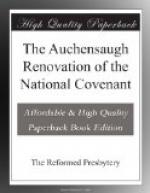Object. 3. “Albeit the National Covenant should be granted to be binding upon us the people of Scotland, and, therefore, may be renewed: yet, to renew the Solemn League with England and Ireland, as matters now stand, is ridiculous and impossible.”
Ans. This objection is partly answered before in the Sermons, [page 14,] and may be further cleared, if we consider, that the Solemn League and Covenant may be taken under different respects, either as a league amongst men or a covenant between God and men: in the former sense, as it notes a league offensive and defensive made betwixt the collective bodies of these kingdoms, it is certain it cannot be taken by us, who are but a poor insignificant handful of people, far from any authority, or influence in church or commonwealth; the collective and representative body of the three kingdoms having basely abandoned their covenant with God, and united in a sinful compact opposite thereto, so that to make a league with England or Ireland in this sense, were to enter into a sinful confederacy with apostate covenant breakers; but in the latter acceptation, as it is a covenant with God, not as a witness only, but also as a party contracting, there is no absurdity or impossibility why Scotland, or any part thereof, may not renew it, obliging themselves by a solemn vow to perform what they are bound to antecedently by the law of God. And if it be considered as an association, it respects those only who now do, or hereafter shall, adhere unto it, whether here or in the other two kingdoms. Hence, the words in the preamble of the Solemn League and Covenant, expressing the several ranks and the extent of the Covenanters, were not read at the renewing of it at Douglass, because we own ourselves to be under a league with none but such as own the covenanted Reformation; these, and these only, we heartily embrace as our colleagues, into the nearest and dearest bonds of Christian union and fellowship, according to this League and Covenant.




